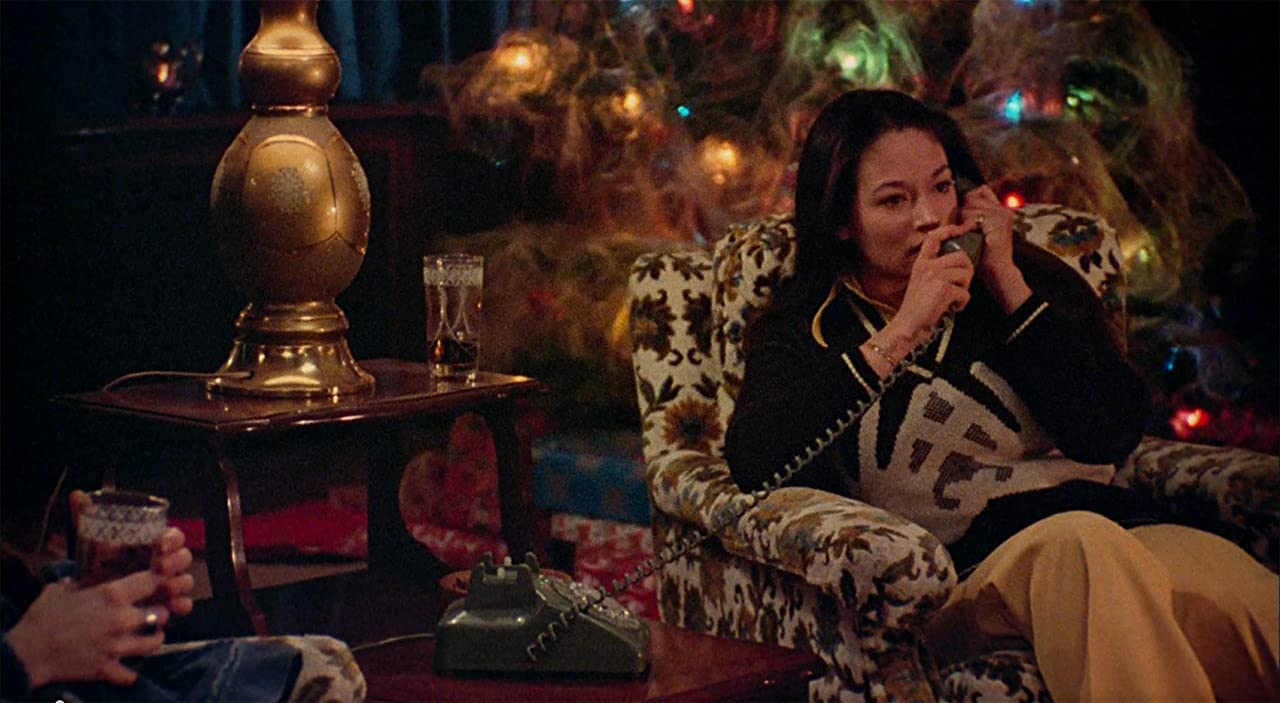Black Christmas (1974): Early Slasher, Twisted Christmas Movie, 1970s Abortion Views Time Capsule
A retrospective movie review.

“Black Christmas” is the kind of title that promises something big: a kind of ultimate subversion of Christmas Movie genre conventions. It also makes it easy to go into the movie with preconceptions, expecting something exploitative made to rake in dollars based on what the title sells.
On its promise, it lives up to them. It’s about as dark as a Christmas movie could get, while still feeling like an actual Christmas movie rather than a parady of one. The plot centres around a female college sorority house that has been receiving creepy prank calls. The father of one girl arrives to pick her up for Christmas and discovers her missing. It quickly transpires that there is a killer on the loose around campus, stalking and killing, slicing and dicing. Finding the missing girls, tracking the killer, and preventing more murders becomes the focus of the story. So yeah, not your average Christmas themes. It’s grim, sinister, and nerve-jangling—though it also has a fair bit of humour in the first half.
For horror fans, and as a very early entry into the slasher genre, it is much more substantial than the exploitative B-movie you might expect. It’s considered a genuine classic.
Actually, it’s full of surprises. Bob Clark directed, with Reginald Morris as Director of Photography. The same duo worked together on A Christmas Story (1983) (the fact they did both being quite fantastic) and Porky's (1981). Morris was also DP on Superman (1978). So there was heavyweight talent behind the camera—which shows.
The photography, editing, and camerawork are all from the top shelf. You’d struggle to find better in any slasher. There's memorable comic performances. Sets are designed with nice attention to detail, and the writing has a style of its own. The first half of the movie is stuffed with memorable lines.
Stylish shots litter the film. The use of rich blacks is great, dripping with atmosphere and making good use of dramatic lighting and black space. The glow of Christmas lights and decorations is striking and quite artistic. There's nothing “B-movie” about the visuals. It’s an image that shows 1970s analogue film, with its sizzling grain and deep dynamic range, at its finest.
On the fun side, the movie depicts female sorority house culture, where the action of the plot centres, with surprising originality and biting humour. Mrs. Mac (Marian Waldman - Deranged (1974)) is the lovable alcoholic housemother of the sorority house, trying to take care of a group of college girls she wryly declares would "hump the Leaning Tower of Pisa if they could get to the top of it." The set design has good attention to detail, and the unplanned visit from the missing girl's father is memorable-including drunken monologues about how turtles mate continuously for days on end.
Waldman is great in the role as Mrs. Mac, filling the house with mischievous soul and comic energy. She does her best to make the house presentable to guests, launches tirades at her wayward cat, and rummages around the house in search of the next half-bottle of spirits (which she has an apparently infinite supply of, stashed in hard-to-remember spots). She is in many ways the soul of the story, and it’s a shame her role wasn’t expanded further. This is a movie of multiple tones, though, and the narrative shifts into a darker mood as it progresses.
The story takes abortion as a central theme. Jess (Olivia Hussey - Romeo and Juliet (1968)), the final girl and one of the sorority house members, faces an unplanned pregnancy and decides on abortion. Her partner, Peter (Keir Dullea - 2001: A Space Odyssey (1968)), feels entitled to a veto on this decision, and to declare their upcoming marriage as a result of the pregnancy. Faced with the reality that Jess has her own plans, he freaks out and responds with an ominous-sounding threat, retreating into solitude in brooding rage.
Although Jess and her perspective is the more prominent one, the movie also shows Peter as a victim of emotional torture, liable to become mentally unhinged and start stalking and murdering women around campus as a result of not having control over Jess's abortion. Where the movie sits in relation to Peter's perspective is slightly foggy, but reads as partly sympathetic. The story almost implies Peter losing his mind and embarking on a murder spree (and it is not clear whether he is the killer) would be an understandable response. It also allows for a reading (not prominent, but it's there) that Jess may be a serial killer of her own kind, able to get away with “murder” (abortion).
So, err… it's an exploration of abortion through a "1970s" lens, going to some effort to accommodate anti-abortion readings that are considered chauvinistic, if not bat-shit crazy, to most today. It doesn't play like an anti-abortion movie, either (Jess's view is given more weight), but it makes the point of writing two radically contrasting perspectives into the script, presumably to cater to its audience of the time.
Catering to populist views is something that still happens today, both in art and politics. For example, in the early days of Donald Trump's presidency media outlets that aim for centrism (such as The New York Times) went to considerable lengths to find and voice the "other side" of stories, attempting to create balance. The idea is to equally represent both sides of every view that carries popular support - no matter how maddeningly ludicrous that typically ends up being.
The same line of thinking seems to have held sway in how this script was written. It’s a kind of pandering or ambivalence that reduces the film's artistic integrity dramatically, at least on the storytelling level, despite its technical qualities and "early slasher" subgenre kudos. It does make for an interesting time capsule of the views and attitudes held on abortion in the US of the 1970s. You can read them in how the audience is set up to understand events and react to them.
As for the storytelling, we might go back to the title. Black Christmas sounds, as well as promising, a bit hokey. The movie is a bit hokey, and that's part of what makes it fun. It goes over-the-top in a knowing way. For example, a detective frantically running around a telephone exchange building to locate the right physical connections, so he can trace the calls.
The closing shot plays into this side of the movie, too. A slow zoom out from the sorority house, Christmas decorations ablaze in the garden, police officer stationed at the door, but with something… ahem. Off. It's a cheesy shot, but it works fine. It reminds that this is a horror movie that isn't trying to be taken too seriously.
Its botching of weighty themes makes some wince-inducing moments, but as a slasher movie, or an alternative Christmas movie, Black Christmas works on simpler, more visceral levels. It’s an early slasher that is impressively well-made, humorous, and scary. It’s hokey in places, but never saccharine. Effective as a counter to the oversweet tone of many traditional Christmas movies.
Many of us need a pick-me-up around the time of Christmas, but it doesn't need to be a whitewashing. To balance that out is what makes this a horror movie that may, if you have the stomach for it, be worth watching over the holidays.
James Lanternman writes movie reviews, essays, and moonlit thoughts. You can reach him at [email protected].
Previously… The Value of Changing Your Mind
